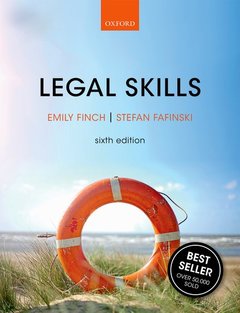Description
Legal Skills (6th Ed.)
Authors: Finch Emily, Fafinski Stefan
Language: English
Publication date: 03-2017
504 p. · 19.7x24.7 cm · Paperback
Out of Print
504 p. · 19.7x24.7 cm · Paperback
Out of Print
Description
/li>Biography
/li>
The best-selling legal skills textbook in the market, Legal Skills is the essential guide for law students, encompassing all the academic and practical skills in one manageable volume. It is an ideal text for students new to law, helping them make the transition from secondary education and giving them the skills they need to succeed from the beginning of their degree, through exams and assessments and into their future career. The first part covers 'Sources of Law' and includes information on finding and using legislation, ensuring an understanding of where the law comes from and how to use it. The second part covers 'Academic Legal Skills' and provides advice on general study and writing skills. This part also includes a section on referencing and avoiding plagiarism amongst a number of other chapters designed to help students through the different stages of the law degree. The third and final part is dedicated to 'Practical Legal Skills'
Emily Finch is an experienced law lecturer and has taught criminal law, criminal evidence and cybercrime at a number of institutions. Her overarching research interest is in public perceptions of crime and criminality and the impact of technology on criminal activity, especially the criminogenic potential of the internet. She has a particular interest in jury decision-making and has conducted a number of empirical studies that explore factors that influence jury verdicts in rape, theft and fraud trials. Her work on identity theft won the Joseph Lister Award in 2005 and her current research focus is on dishonesty and the niche vulnerability of older internet users. Stefan Fafinski has extensive experience in teaching intellectual property law, cyberlaw, and cybercrime. He is interested in the social factors that influence the misuse of information technology and the challenges that networked technologies present in general. He won the Joseph Lister Award for his work on the social aspects of computer crime in 2006.
© 2024 LAVOISIER S.A.S.
These books may interest you

Criminology Skills 49.66 €

The Insider's Guide to Legal Skills 244.87 €


